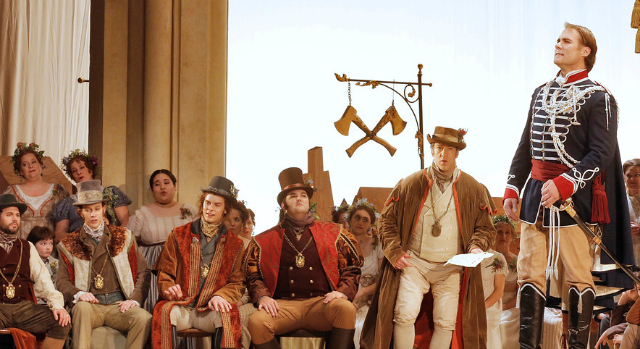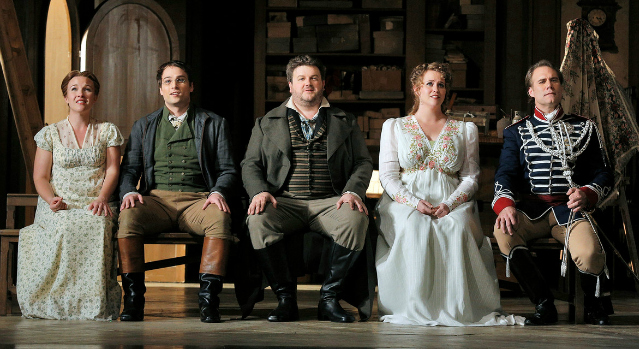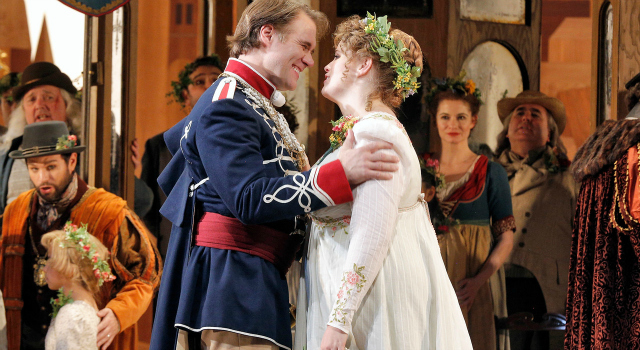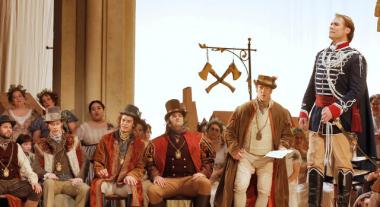
Well over a century before American Idol and The Voice became sensations on American television, Richard Wagner used a singing competition as the premise of his sole comic opera, Die Meistersinger von Nürnberg (1868). Some things, for better and worse, are truly timeless, as a grand-scale San Francisco Opera staging of the piece at the War Memorial Opera House proves.
Writ large in all ways, this David McVicar production, a joint venture with Lyric Opera of Chicago and Glyndebourne Festival Opera, employs big-name singers, a huge supporting cast for stage-cramming crowd scenes, multiple picturesque sets crowned with soaring floral-pattern vaulting, and stately tempos in a five-hour and 45-minute sprawl.
But the most successful and engaging aspects of this Meistersinger are not about big impact. They’re the lusciously intimate moments, both buoyantly comic and bittersweet, that stud the evening.
Several of them are strung together in a beautifully rendered first scene of the third act. Wagner’s genius for tonal shifts and psychological insight takes palpable human form, as the musings of a lonely widowed cobbler (baritone James Rutherford as Hans Sachs) gives way to the feverishly romantic dream of a knight (tenor Brandon Jovanovich as Walther von Stolzing), both of whom are in love, in their very different ways, with the same woman.
So, captured in a comic interlude complete with Charlie Chaplin-esque slapstick involving a piece of stubbornly sticky paper, is the haplessly unself-aware and mockingly named Sixtus Beckmesser (a brightly drawn and wholly satisfying performance by baritone Martin Gantner in his company debut).
Soprano Rachel Willis-Sørenson, in another first appearance with San Francisco Opera, plays the much beloved Eva, whose hand in marriage is the grand prize for this season’s final episode of Nürnberg Idol. If her voice blooms more richly than her undernourished acting, none of that matters as the scene reaches its sublimely calm, musically transfixing climax.

Joined by mezzo soprano Sasha Cooke and tenor Alek Shrader, both wonderfully fresh as the servant-class lovers Magdalene and David, the principals line up on Sachs’ cobbler’s bench for a simply staged, emotionally layered and transporting quintet.
While first-time S.F. Opera conductor Sir Mark Elder’s tempos run to the turgid at times, the patient unfolding of the music pays rich dividends here. Pale Constable’s lemony, summer light, which pierces but never quite penetrates the solitary cobbler’s den, adds a mordant note of atmospheric enhancement to the scene.
There are pleasures, if less reliably sustained, throughout. Revival co-directors Marie Lambert and Ian Rutherford give the first act a textured sense of felt life in a setting of the composer’s own story and libretto transposed here from the 16th to the 19th century. Under a weirdly homely, religious triptych (production design by Vicki Mortimer), a church service is finishing up and a meeting of the master singers’ guild about to begin. One small detail after another feels vivid and authentic – like those in a Bruegel painting or a Dickens novel. A child gets bored and antsy during the service. The two pairs of young lovers flirt and cannily size each other up. The master singers, in the production’s excellent, character-stamping costumes, come off as variously, fussy, vain, pompous, feeble, likable, and mordantly self-contained (Hans Sachs).
The evening goes awry when the directors and their collaborators try too hard. Both the Act Two riot scene and the Act Three crowd festivities, complete with jugglers and stilt-walkers, are self-defeating blurs of visual excess. Andrew George’s anomalous choreography features pelvic bumps and thrusts. The famous scene in which Sachs “marks” Beckmesser’s love serenade by hammering away on his cobbler’s bench, is inelegantly staged and executed. Rutherford, in a performance of the opera’s central role that goes in and out of focus, is not at his best here.
Singing always matters crucially in opera, of course, but in Meistersinger it meta-matters, since much of what’s sung is either about singing or rehearsals and/or performances of the songs everyone’s singing about. Rutherford and Willis-Sørenson both had uneven outings. His voice, which sounded nicely burred with wisdom and grief, turned routine at times. She launched some lovely and stirring phrases, but the transitions were sometimes labored. Her static acting didn’t help.

Jovanovich, appealingly self-possessed and singing with a light, clean tone early on, was working under a handicap. His cold symptoms had worsened during the long opening night, the audience was told before the start of Act Three. As usual, such news gets the house on the artist’s side, as Jovanovich hit shiny high notes and phrases while losing some of the legato line and smooth register shifts this fine tenor can produce. He got a big hand at the curtain.
It wasn’t only American pop culture that came to mind as this Meistersinger came to a close. Sachs’ final plea for a pure, German art, untainted by “foreign mists” landed uncomfortably at a time unhinged by the recent Paris attacks and hotly kindled fears of those outside a protected “pure” circle.
Like other great works, one was reminded, this one never stays locked in its own time. It goes on speaking, challenging, unsettling and moving audiences across the centuries.

